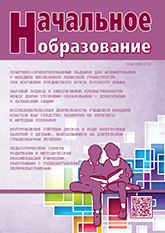The article discusses the possibilities of using a differentiated approach to teaching the Russian language, which takes into account both the stage of mastering the subject content and the degree of individual preparation of each student, his abilities, interests, needs, motivation. The authors determined the specifics of modeling tasks of the basic and increased levels of complexity, which allow, based on the knowledge gained and the speech experience of junior schoolchildren as native speakers, to successfully form their universal educational actions (cognitive, communicative, regulatory), which meets the requirements of the Federal State Educational Standard of the Primary General Education to the planned subject and metasubject learning outcomes. The examples of differentiated tasks aimed at the development of speech-thinking abilities, logical thinking, cognitive skills, and skills of independent educational activity are presented.
differentiated approach; younger students; academic subject “Russian language”; teaching methods and techniques corresponding to the cognitive type of the student; orientation to the zone of proximal development; design of tasks of basic and advanced levels of complexity; the formation of universal educational actions; requirements for subject and metasubject learning outcomes; ensuring continuity in the process of teaching the Russian language
1. Vinogradova N.F. Individualizacija obuchenija v nachal'noj i profil'noj shkolah: paradoksy vzaimodejstvija [Individualization of education in primary and specialized schools: paradoxes of interaction]. Profil'naja shkola [Profile school]. 2003, I. 2, pp. 13-16. EDN: https://elibrary.ru/OHGHEL
2. Vinogradova N.F. Kak realizovat' lichnostno orientirovannoe obrazovanie v nachal'noj shkole? [How to implement student-centered education in primary school?]. Nachal'naja shkola [Primary School]. 2001, I. 9, p. 10.
3. Gosteva Ju.N. Differencirovannyj podhod k obucheniju russkomu jazyku [Differentiated approach to teaching the Russian language]. Vestnik Rossijskogo universiteta druzhby narodov [Bulletin of the Peoples' Friendship University of Russia]. 2008, I. 1, pp. 67-70. EDN: https://elibrary.ru/ICJZOB
4. Rybchenkova L.M., Aleksandrova O.M. Russkij jazyk: rabochie programmy. 5-9 klassy: posobie dlja uchitelej obshheobrazovatel'nyh uchrezhdenij [Russian language: work programs. 5-9 grades: a guide for teachers of educational institutions]. Moscow: Prosveshhenie Publ., 2012. 108 p.
5. Unt I.T. Individualizacija i differenciacija obuchenija [Individualization and differentiation of training]. Moscow: Pedagogika Publ., 1990. 189 p.
6. Federal'nyj gosudarstvennyj obrazovatel'nyj standart obshhego nachal'nogo obrazovanija [Federal state educational standard of general primary education]. Moscow: Prosveshhenie Publ., 2010. 32 p.
7. Holodnaja M.A. Kognitivnye stili i intellektual'nye sposobnosti [Cognitive styles and intellectual abilities]. Psihologicheskij zhurnal [Psychological journal]. 1992, V. 13, I. 3, pp. 84-93. EDN: https://elibrary.ru/QZXMUD
8. Holodnaja M.A. Psihologicheskij status kognitivnyh stilej: predpochtenija ili «drugie» sposobnosti? [The psychological status of cognitive styles: preferences or “other” abilities?]. Psihologicheskij zhurnal [Psychological journal.]. 1996, V. 17, I. 1, pp. 61-69. EDN: https://elibrary.ru/PVNQYZ
9. Holodnaja M.A. Kognitivnye stili: o prirode individual'nogo uma [Cognitive Styles: On the Nature of the Individual Mind]. St. Petersburg: Piter Publ., 2004. 384 p.
10. Jakimanskaja I.S. Lichnostno orientirovannoe obrazovanie [Personally oriented education]. Novye cennosti obrazovanija [New values of education]. 1995, I. 1, pp. 50-55.






